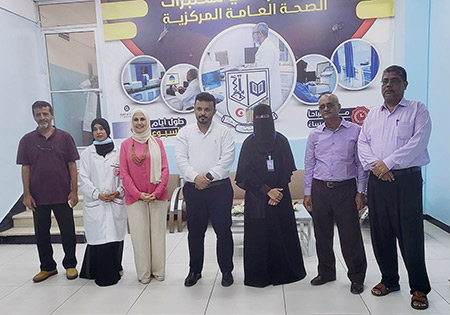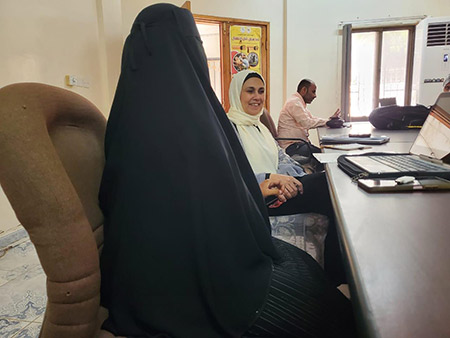 Participants during the capacity assessment at the Aden central public health laboratory. Photo credit: WHO Yemen
Participants during the capacity assessment at the Aden central public health laboratory. Photo credit: WHO Yemen
21 August 2024, Aden, Yemen – Antimicrobial resistance (AMR) occurs when bacteria, viruses, fungi and parasites no longer respond to medicines. It is a huge problem for the health of humans, animals and the environment, and in countries facing protracted crises like Yemen, the challenges are even greater.
Dr Arturo Pesigan, WHO Representative in Yemen, described the situation: “AMR has contributed to an estimated 5 million deaths globally since 2019 and low-income countries like Yemen, which face high levels of poverty and inequality, are among the most affected”.
With support from the Pandemic Fund, WHO and the Ministry of Public Health and Population (MoPHP) are working together to respond to the threat of AMR, expanding surveillance, raising awareness, promoting the rational use of medicines, and coordinating, in collaboration with the Food and Agricultural Organization of the United Nations (FAO), with Yemen’s agricultural and environmental sectors.
In line with Yemen’s national AMR action plan (2022–2026), work is underway to scale-up laboratory surveillance capacities as per WHO and FAO recommendations. Capacity assessment is taking place, using the laboratory assessment on antibiotic resistance testing capacity tool developed by the United States Centers for Disease Control and Prevention, which will lead to facility-level improvements in 12 AMR surveillance sites across the country.
 AMR WHO consultant meeting with MoPHP AMR focal point. Photo credit: WHO Yemen
AMR WHO consultant meeting with MoPHP AMR focal point. Photo credit: WHO Yemen
With support from the World Bank’s Emergency Human Capital Project (EHCP), WHO conducted awareness raising on AMR in public and private hospitals in 2023, training more than 100 clinicians at hospital level in the rational use of medicines. Training focused on the prescribing and dispensing of medicines and antibiotics on the basis of safety and cost-effectiveness. In collaboration with UNICEF, additional trainings are planned for 2024, targeting general practitioners at the primary health care level.
WHO also worked with the MoPHP to develop a national medicines policy and regular updates to the national essential medicines list and is supporting a review of national standard treatment guidelines.
These ongoing activities aim to combat AMR and preserve the effectiveness of life-saving antibiotics and medicines.
Learn more:
https://www.who.int/news-room/fact-sheets/detail/antimicrobial-resistance




